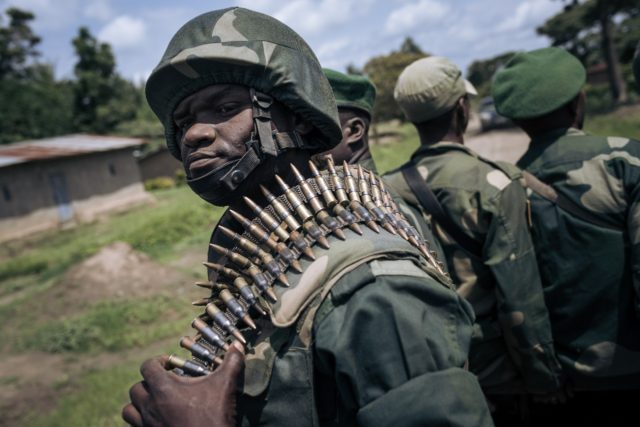Hopes for peace in eastern DR Congo, have been dashed three months after President Felix Tshisekedi proclaimed a state of siege in two provinces, as the army grapples with familiar failings, say analysts.
Tshisekedi resorted on May 6 to the strongest measure he could take under the constitution, in a bid to end the endemic insecurity in the east where massacres and clashes involving armed groups have prevailed since the end of the Second Congo War in 2003.
Civilian power in North Kivu and Ituri provinces was turned over to a military governor and a deputy governor drawn from the police, while the duties of provincial governments were transferred to the military authorities.
Despite this drastic move, “nothing has changed,” said political scientist Nice Mughanda, a university professor in North Kivu. “There is nothing new that has been done”.
“There’s the problem of available resources — the means are limited and logistics are weak,” added Promise Matofali Yonama, a representative at the North Kivu provincial assembly.
Since May 6, armed groups have killed 485 civilians in Ituri and North Kivu, according to a tally established on August 5 by experts of the Kivu Security Tracker (KST), an NGO that monitors violence.
The Allied Democratic Forces (ADF), which emerged as a rebel movement in neighbouring Uganda in 1996, is responsible for 254 deaths, according to KST figures. The ADF is today presented as the Islamic State’s Central Africa Province.
Other militias, including the Rwandan Hutu rebels of the Democratic Forces for the Liberation of Rwanda (FDLR), are held responsible for 231 deaths.
The previous quarter, the KST documented 464 civilian deaths, of which 225 deaths were attributed to the ADF.
In Ituri, the army says 121 militiamen have been killed since the start of the state of siege, including 32 ADF.
‘Dire failure’
The National Assembly has just renewed the state of siege for the fifth time but has also called on its Defence and Security Commission to assess the effectiveness of the measure.
“(This is) a fiasco which should not be renewed indefinitely,” said Patrick Mundeke, a representative in North Kivu of the Together for the Republic party of Moise Katumbi, an influential businessman and former governor of Katanga.
“The state of siege is a dire failure,” said Masika Salama, a 25-year-old student from Beni, which lies near the border with Ituri.
“People continue to be killed, kidnappers operate in the same old way without getting caught. The situation is becoming more serious than before.”
Mughanda said the state of siege should be suspended.
“Before, we were able to get out of Beni and go to Bunia (the capital of Ituri). During the state of siege, it became extremely dangerous to make the trip. The range of killings increased. The attackers are now also active in Ituri, north of Beni.”
The goal of the state of siege was to streamline decision-making by placing authority in the hands of the military.
But, said Mughanda, “You can’t decree a state of siege with an army that has been infiltrated, an army that is undisciplined, an army with officers who steal the rations and the wages of the soldiers at the front.”
20 officers prosecuted
Some 20 officers are being prosecuted by the military judiciary, which accuses them of having embezzled funds intended for the campaign. The Congolese government has disbursed tens of millions of dollars for operations in the two provinces, according to a senior official.
Others fear that the state of siege has removed a crucial layer of civilian oversight of military operations.
“We must contain the state of siege in the territories of Beni (North Kivu) and Irumu (Ituri)” where many atrocities have been committed, said provincial deputy Promesse Matofali Yonama.
Goma, a large city where urban banditry is the daily lot of the citizens, is about the only place where residents express satisfaction with the emergency measures.
“There have been fewer killings, fewer burglaries and shots are no longer heard every night,” said Hussein Ally Compani, a motorcycle taxi driver.
“The army is doing a good job,” said Augustin Kapila, an official of the Tshisekedi’s Union for Democracy and Social Progress (UDPS) party.
“Groups have been taken neutralised and others are giving themselves up. We hope the army will continue down this path.”
strs-bmb/at/nb/ri/pvh

COMMENTS
Please let us know if you're having issues with commenting.